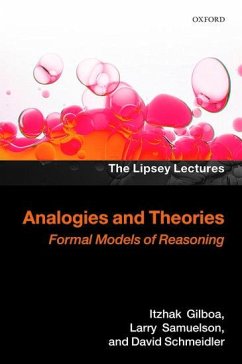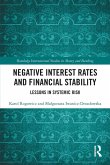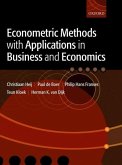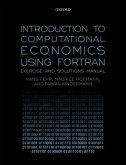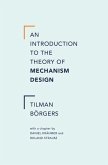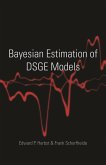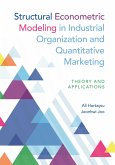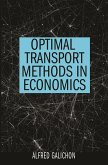Itzhak Gilboa (Chair of Economic Theory and Tel-Av Decision Theory, Larry Samuelson (Yale Un A. Douglas Melamed Professor of Economics, David Schmeidler (Tel-Aviv University Professor Emeritus and Ohio
Analogies and Theories
Formal Models of Reasoning
Itzhak Gilboa (Chair of Economic Theory and Tel-Av Decision Theory, Larry Samuelson (Yale Un A. Douglas Melamed Professor of Economics, David Schmeidler (Tel-Aviv University Professor Emeritus and Ohio
Analogies and Theories
Formal Models of Reasoning
- Gebundenes Buch
- Merkliste
- Auf die Merkliste
- Bewerten Bewerten
- Teilen
- Produkt teilen
- Produkterinnerung
- Produkterinnerung
The book describes formal models of reasoning that are aimed at capturing the way that economic agents, and decision makers in general think about their environment and make predictions based on their past experience.
Andere Kunden interessierten sich auch für
![Negative Interest Rates and Financial Stability Negative Interest Rates and Financial Stability]() Karol RogowiczNegative Interest Rates and Financial Stability42,99 €
Karol RogowiczNegative Interest Rates and Financial Stability42,99 €![Econometric Methods with Applications in Business and Economics Econometric Methods with Applications in Business and Economics]() Christiaan Heij ( Associate Professor at the Econometric InstituteEconometric Methods with Applications in Business and Economics144,99 €
Christiaan Heij ( Associate Professor at the Econometric InstituteEconometric Methods with Applications in Business and Economics144,99 €![Introduction to Computational Economics Using FORTRAN Introduction to Computational Economics Using FORTRAN]() Hans Fehr (Professor of Economics, Professor of Economics, UniversiIntroduction to Computational Economics Using FORTRAN64,99 €
Hans Fehr (Professor of Economics, Professor of Economics, UniversiIntroduction to Computational Economics Using FORTRAN64,99 €![An Introduction to the Theory of Mechanism Design An Introduction to the Theory of Mechanism Design]() Tilman Borgers (Uni Samuel Zell Professor of the Economics of RiskAn Introduction to the Theory of Mechanism Design103,99 €
Tilman Borgers (Uni Samuel Zell Professor of the Economics of RiskAn Introduction to the Theory of Mechanism Design103,99 €![Bayesian Estimation of Dsge Models Bayesian Estimation of Dsge Models]() Edward P. HerbstBayesian Estimation of Dsge Models58,99 €
Edward P. HerbstBayesian Estimation of Dsge Models58,99 €![Structural Econometric Modeling in Industrial Organization and Quantitative Marketing Structural Econometric Modeling in Industrial Organization and Quantitative Marketing]() Ali HortacsuStructural Econometric Modeling in Industrial Organization and Quantitative Marketing52,99 €
Ali HortacsuStructural Econometric Modeling in Industrial Organization and Quantitative Marketing52,99 €![Optimal Transport Methods in Economics Optimal Transport Methods in Economics]() Alfred GalichonOptimal Transport Methods in Economics67,99 €
Alfred GalichonOptimal Transport Methods in Economics67,99 €-
-
-
The book describes formal models of reasoning that are aimed at capturing the way that economic agents, and decision makers in general think about their environment and make predictions based on their past experience.
Hinweis: Dieser Artikel kann nur an eine deutsche Lieferadresse ausgeliefert werden.
Hinweis: Dieser Artikel kann nur an eine deutsche Lieferadresse ausgeliefert werden.
Produktdetails
- Produktdetails
- Lipsey Lectures
- Verlag: Oxford University Press
- Seitenzahl: 194
- Erscheinungstermin: 14. Juli 2015
- Englisch
- Abmessung: 241mm x 161mm x 22mm
- Gewicht: 440g
- ISBN-13: 9780198738022
- ISBN-10: 0198738021
- Artikelnr.: 42097054
- Herstellerkennzeichnung
- Libri GmbH
- Europaallee 1
- 36244 Bad Hersfeld
- gpsr@libri.de
- Lipsey Lectures
- Verlag: Oxford University Press
- Seitenzahl: 194
- Erscheinungstermin: 14. Juli 2015
- Englisch
- Abmessung: 241mm x 161mm x 22mm
- Gewicht: 440g
- ISBN-13: 9780198738022
- ISBN-10: 0198738021
- Artikelnr.: 42097054
- Herstellerkennzeichnung
- Libri GmbH
- Europaallee 1
- 36244 Bad Hersfeld
- gpsr@libri.de
Itzhak Gilboa obtained a BSc in mathematics and computer science and a BA in economics. He studied mathematical economics with David Schmeidler and obtained his MA (1984) and his PhD (1987) in the field of decision theory. Gilboa's research focuses on decision under uncertainty, and has worked extensively with David Schmeidler on axiomatic foundation of non-Bayesian decision theory. He has also contributed to complexity in game theory, evolutionary game theory, and social choice. He has published three books, an Econometric Society Monograph Series text entitled Theory of Decision under Uncertainty, and two textbooks entitled Rational Choice, and Making Better Decisions. Professor Gilboa holds the AXA Chair of Decision Sciences at HEC, Paris, the Chair of Economic Theory and Decision Theory at Tel-Aviv University. Larry Samuelson received BA, MA, and PhD degrees from the University of Illinois. After appointments at Penn State and the University of Wisconsin, he has, since 2007, been a professor of economics at Yale University, and is the A. Douglas Melamed Professor of Economics at Yale. He has served as a co-editor of Econometrica and the American Economic Review. Professor Samuelson's research has focussed on game theory, with emphasis on the evolutionary foundations of behaviour in games and on behaviour in repeated games. David Schmeidler is Professor Emeritus at Tel-Aviv University and at The Ohio State University. He received his PhD in Mathematics from the Hebrew University of Jerusalem under the supervision of Robert Aumann. HE has worked on cooperative games, general equilibrium analysis, social justice, implementation, and other fields. Over the past few decades he has focused on decision under uncertainty, mostly in the absence of well-defined probabilities.
1: Introduction
2: Inductive Inference: An Axiomatic Approach
3: Subjectivity in Inductive Inference
4: Dynamics of Inductive Inference in a Unified Framework
5: Analogies and Theories: The Role of Simplicity and the Emergence of Norms
6: The Predictive Role of Counterfactuals
2: Inductive Inference: An Axiomatic Approach
3: Subjectivity in Inductive Inference
4: Dynamics of Inductive Inference in a Unified Framework
5: Analogies and Theories: The Role of Simplicity and the Emergence of Norms
6: The Predictive Role of Counterfactuals
1: Introduction
2: Inductive Inference: An Axiomatic Approach
3: Subjectivity in Inductive Inference
4: Dynamics of Inductive Inference in a Unified Framework
5: Analogies and Theories: The Role of Simplicity and the Emergence of Norms
6: The Predictive Role of Counterfactuals
2: Inductive Inference: An Axiomatic Approach
3: Subjectivity in Inductive Inference
4: Dynamics of Inductive Inference in a Unified Framework
5: Analogies and Theories: The Role of Simplicity and the Emergence of Norms
6: The Predictive Role of Counterfactuals

